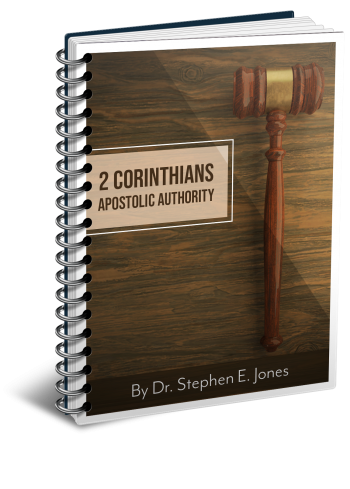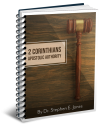Latest Posts
View the latest posts in an easy-to-read list format, with filtering options.

An in-depth commentary/study on the second book of Corinthians
Category - Bible Commentaries

Paul says in 2 Corinthians 12:1 (NASB),
1 Boasting is necessary, though it is not profitable; but I will go on to visions and revelations of the Lord.
Indeed, Paul was compelled to boast of his fleshly qualifications in the previous chapter, though personally, he was irritated and repulsed by such boastings. The KJV reads, “It is not expedient for me doubtless to glory.” Young’s Literal Translation reads, “To boast, really, is not profitable for me.” The Emphatic Diaglott reads it as a question, saying, “Is it necessary to boast? It is not profitable indeed.”
I favor The Emphatic Diaglott here, because I think it expresses Paul’s viewpoint best. To state that “boasting is necessary” (NASB) is perhaps too emphatic, and unless a reader is careful, he or she may misunderstand. Obviously, Paul questioned any man’s right to boast about his Jewish or Israelite heritage, if his intent was to use it to elevate his position over other ethnicities.
Paul then turns to more important things: “visions and revelations of the Lord.” This was what Paul valued. He valued the revelation of the word, no doubt believing that this was the mark of a true apostle. While the “false apostles” (2 Cor. 11:13) set forth their genealogical qualifications, to Paul it was just “dung” (Phil. 3:8, KJV).
If genealogy and rabbinic education had been important, Paul might have been in a better position than his critics, for there is little doubt that he was better educated than most (if not all) of them. Furthermore, as to genealogy, he was “of the tribe of Benjamin, a Hebrew of Hebrews” (Phil. 3:5). But he counted it all as dung (or “rubbish,” NASB) “in view of the surpassing value of knowing Christ Jesus my Lord” (Phil. 3:8).
Paul then gives an example of “visions and revelations” that are important to him. We read in 2 Cor. 12:2-4,
2 I know a man in Christ who fourteen years ago—whether in the body I do not know, or out of the body I do not know, God knows—such a man was caught up to the third heaven. 3 And I know how such a man—whether in the body or apart from the body I do not know, God knows— 4 was caught up into Paradise, and heard inexpressible words, which a man is not permitted to speak.
The way in which Paul tells the story gives us the impression that he had not told the Corinthians about this earlier. He seemed to assume that they did not know, and so Paul had to emphasize that he did not know if the man had been literally caught up to Paradise (“in the body”) or if his spirit had left his body (“apart from the body”). It seems to me that he would not have felt it necessary to repeat this if the Corinthians had been familiar with the story.
Secondly, there has been much speculation over the years about the identity of this man who had been “caught up into Paradise.” This unusual and elevated experience has led many to believe that Paul was covertly talking about himself. Who else might be worthy of such an experience? Some also believe that this occurred when Paul was stoned outside of Lystra and left for dead (Acts 14:19).
However, this event took place fourteen years earlier. Paul was writing this in 58 A.D., just ten years after he and Barnabas had been commissioned to begin their first missionary journey in 47 A.D. Paul was stoned at Lystra during this first missionary journey, probably in the year 48 A.D. Paul dated the story about four or five years before he was stoned, so if Paul had been referring to himself, he would have been referring to an unknown experience while he was still in Tarsus.
Some texts, such as the KJV read “above fourteen years ago,” indicating that this occurred more than fourteen years ago. However, Panin’s Numeric New Testament agrees with the NASB, saying, “I know a man in Christ fourteen years ago…” The internal mathematics (gematria) shows that this is the correct text.
It appears that Paul had met this unknown believer while he was living in Tarsus, where he had lived since his return from Arabia. It appears that Paul had not returned to Tarsus since his ordination with Barnabas. So he did not know if the man was still alive in 58 A.D.
Paul continues in 2 Corinthians 12:5, 6,
5 On behalf of such a man will I boast; but on my own behalf I will not boast, except in regard to my weaknesses. 6 For if I do wish to boast I shall not be foolish, for I shall be speaking the truth; but I refrain from this, so that no one may credit me with more than he sees in me or hears from me.
Paul seems to say that someone else was caught up into Paradise, saying, “on my own behalf I will not boast.” The apostle was willing to boast about others, but not about his own revelation. Yet he then asserts that if he should boast about his own revelation, he would speak only the truth, telling the story with no exaggeration.
“But,” Paul says, “I refrain from this.” Paul modestly refrained from speaking of his own revelation. This too seems to indicate that someone else had been caught up to Paradise—perhaps a friend in his fellowship in Tarsus.
The next verses, however, seem to indicate that Paul was indeed the man caught up into Paradise. Paul writes in 2 Cor. 12:7-9,
7 Because of the surpassing greatness of the revelations, for this reason, to keep me from exalting myself, there was given me a thorn in the flesh, a messenger of Satan to buffet me—to keep me from exalting myself! 8 Concerning this I entreated the Lord three times that it might depart from me. 9 And He has said to me, “My grace is sufficient for you, for power is perfected in weakness.” Most gladly, therefore, I will rather boast about my weaknesses, that the power of Christ may dwell in me.
Many see this as proof that Paul had been talking about himself. Paul had been given “a thorn in the flesh” to keep him humble on account of “the surpassing greatness of the revelations.”
What revelations? Was Paul referring to the “inexpressible words” heard by the man in Paradise? Or had Paul, in his letter, moved on from that man’s revelation to his own revelations?
If we interpret verse 7 to mean that Paul was admitting that he was the man in question, then why did he go to such trouble as to conceal the man’s identity in the previous verses? Did he at first try to keep from boasting and in the end did he succumb to the temptation to boast?
To say that this man was Paul himself seems to contradict everything that Paul had been saying in the first few verses—especially when he concludes in verse 5 that he was willing to boast about someone else but not of his own revelation and experience. Hence, it seems more likely to me that Paul had moved on from the example of his friend to speak of his own revelations.
In other words, Paul had been given a thorn in the flesh on account of his own great revelations, but not on account of his friend’s trip to Paradise. (Perhaps his friend would have received some thorn in the flesh as well as Paul himself.)
Paul identifies Paradise as being in “the third heaven” (2 Cor. 12:2, 4). The first heaven is the created universe, including the earth and “heavens” above. It is the dimension in which we live.
The third heaven is the abode of God Himself, which is the place of such revelation from His throne. So we read in Rev. 2:7,
7 He who has an ear, let him hear what the Spirit says to the churches. To him who overcomes, I will grant to eat of the tree of life, which is in the Paradise of God.
There is an obvious connection of Paradise with the garden of Eden, where we see the tree of life at the beginning. With the present separation of heaven and earth, this tree of life is said to be in heaven. However, the divine plan is to merge heaven and earth. This merger will take place fully at the end of time, but meanwhile, with the infilling of the Holy Spirit, that process is ongoing.
So it can be said that the tree of life has been planted in our spirits, where our “new man” has full access to its fruit. Hence, this “new man,” having been begotten by immortal seed (1 Peter 1:23-25), has full access to the tree of life. John says in the verse above that the overcomers have access to the tree of life in Paradise, though John does not make it clear if this is a future blessing or a present reality.
This heaven is not distant from us insofar as we measure distance. Distance is applicable only to the first heaven (dimension) in which we live. Both the second and third heaven are “spiritual,” which means that they stand above time and space (distance). Those who live or function in those higher dimensions are invisible to us, but to go there does not require travel as we know it. You might say that to enter those spiritual realms, we go deeper rather than farther.
The second heaven is the great battleground between the third and first heavens. It is the place where, by prayer, intercession, and spiritual warfare, spiritual conditions are altered in order to make changes in the first heaven. Thus, the Kingdom is established in the visible universe as it is in (the third) heaven.
Rev. 2:7 links paradise with the tree of life, the source of immortality. The Garden of Eden contained the tree of life at the beginning of biblical history, because Eden represented heaven on earth. Sin brought death (mortality) and cut off man’s access to the tree of life. It appears that the tree of life withdrew back to heaven—the third heaven, where Paul’s friend was caught up.
History is the process of restoring us back to paradise. The tree of life reappears in Rev. 22:2, no longer withdrawn to the third heaven, but back on earth to fulfill God’s plan for creation. When the tree of life returns to earth, it will be the source for immortal life here on earth for those who are in the Kingdom.
Rev. 22:14, 15 says that there will be people outside of the Kingdom who will NOT have access to the tree of life. I believe this division applies to the Kingdom Age (millennium), during which time the “stone” is still expanding as it slowly fills the whole earth (Dan. 2:35).
Outside the borders of the Kingdom of light will be “outer darkness” (Matt. 8:12), where kingdoms will yet remain under the rule of men who hate Jesus Christ and refuse to acknowledge Him as King. From this outer darkness, “Gog and Magog” will rise up in a final war against Christ toward the end of the thousand years (Rev. 20:8, 9).
Once the rest of the dead are raised at the end of the thousand years, the situation will change once again. In the end, when all has been subdued, all will be restored and will have access to the tree of life.